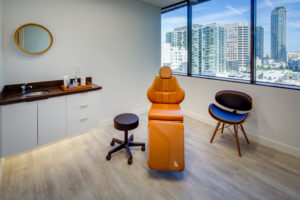Are Month To Month Leases Good Or Bad?
 While some healthcare tenants find themselves in a month-to-month lease arrangement, it doesn’t usually happen on purpose or with a specific strategy in mind. Month-to-month leases are often a byproduct of a lease that has expired when neither the tenant nor the landlord took the initiative to define renewal terms.
While some healthcare tenants find themselves in a month-to-month lease arrangement, it doesn’t usually happen on purpose or with a specific strategy in mind. Month-to-month leases are often a byproduct of a lease that has expired when neither the tenant nor the landlord took the initiative to define renewal terms.
Also called periodic tenancy, a month-to-month lease means that either party may terminate the arrangement at any time with notice (30 days is typically required, but varies per state). In most cases, it’s an unnecessary and avoidable risk that, if realized, could cost a tenant six to seven figures in financial loss.
Why Might a Tenant Choose a Month-to-Month Lease?
One of the most common reasons a tenant ends up in a month-to-month lease is because their initial lease has expired and turned into periodic tenancy without the tenant knowing. Healthcare providers are busy running their practice. As a result, the majority don’t know when their lease expires. If their rent is paid on time, the landlord stays out of their way, and they typically don’t give it any thought.
Some tenants, however, are aware of their lease situation but fear the possible disruption caused by a lease renewal. They’re content with their current lease payment and fear that addressing a lease renewal could result in less favorable terms, namely a rate increase. So, they employ the old “let sleeping dogs lie” mentality.
For those who actively choose periodic tenancy, they often do so to “keep their options open.” The thought is that they can move at any time should they want or need to, potentially avoiding the penalty of breaking a lease early.
However, a month-to-month lease is a high risk for a tenant, especially for medical practices. Unlike retail or startups with a much higher failure rate and often unknown future, medical practices are one of the most stable tenants and rarely relocate. As a result, having a long-term lease that suits their long-term stability plays hand-in-hand.
If you’re in a month-to-month lease, or have considered entering one, there are several concerns you should be aware of, as your practice’s foundation could be at risk. This is not to say that you should never enter into such a lease, but it’s rare that circumstances would justify subjecting your practice to this otherwise precarious position.
 Five Risks of a Month-to-Month Lease Arrangement
Five Risks of a Month-to-Month Lease Arrangement
1. Eviction Without Reason
Does this ever really happen? Yes, more often than one might think, and for several reasons:
I. The landlord has a better and longer-term deal on the table
II. The building ownership changes
III. A neighboring tenant wants to expand
IV. Or… numerous other reasons that often catch tenants off guard
Imagine the consequences of your landlord telling you to vacate your office space within 30 days. For most healthcare practices, this would be a logistical nightmare. But logistics aside, it would be equally difficult and nearly impossible to research, locate, negotiate and build out another suitable space in 30 days. Inevitably, this would result in months of lost revenue for a practice and a significant loss in patients.
2. No Time to Competitively Procure Other Options
There’s a proven strategy to achieve the best possible terms on your lease: negotiate on multiple properties at least 6-12 months in advance of your lease expiration. Research, touring, negotiations and legal review can easily take three to four months. Design, permitting and construction, on average, take another five months. Now consider trying to fit this into 30 days.
Having a weak negotiation posture and inadequate time to shop the market and leverage your options would result in a six-to-seven figure loss for most practices over 5-10 years.
3. Raised Rent or Term Changes
In any given month—and without the consent of the tenant—a landlord in a periodic tenancy lease can change the lease rate and terms. If the lease rate increases substantially, what leverage does the tenant have to dispute it? None. The only way to level the playing field is to have another option fully negotiated that allows them to relocate immediately.
4. Losing Out on Concessions
Month-to-month leases, and even terms fewer than five years, result in the loss of tremendous concessions, such as free rent periods, lower rates, build-out allowances and more. At CARR, we negotiate thousands of healthcare leases every year and encounter many landlords who will offer three times the amount of concessions on a 10-year deal as they will on a 5-year deal. This makes sense: The landlord is willing to invest in the space for long-term security. If a tenant wants to save money and gain substantial concessions on a lease, it’s likely to only come from a multi-year lease.
5. Devaluing the Practice
If a practice sale is in your near future, having a month-to-month lease could actually devalue the practice. One of the most common causes of an acquisition falling apart is the real estate. Landlords can hold the seller and prospective buyer over a barrel, demanding terms that the prospective buyer cannot accept. If the deal does work out, the increased lease rate or lack of concessions needed to improve the space can eat into the sale price of the practice.
The Bottom Line
 While all of these risk factors are true, there is one scenario that might prove to be a legitimate reason to continue a month-to-month lease: If you intend to move very soon (meaning within the next six months with relocation options actively being researched and negotiated). Even then, a short-term lease would provide better security.
While all of these risk factors are true, there is one scenario that might prove to be a legitimate reason to continue a month-to-month lease: If you intend to move very soon (meaning within the next six months with relocation options actively being researched and negotiated). Even then, a short-term lease would provide better security.
Let’s put it this way: A practice that is in a month-to-month lease is equivalent to owning an asset that produces six figures in profit every year and carrying no insurance on that asset. You might escape the need for an insurance claim, but not having insurance would be an unnecessary and easily avoidable risk that could result in a devastating loss.
If you find yourself currently month-to-month or soon to be, it’s in your best interests to consult with an expert healthcare real estate advisor, who can help you develop a customized real estate strategy to maximize your profitability and protect your practice.
For a free lease evaluation click here.
To find an agent near you click here.